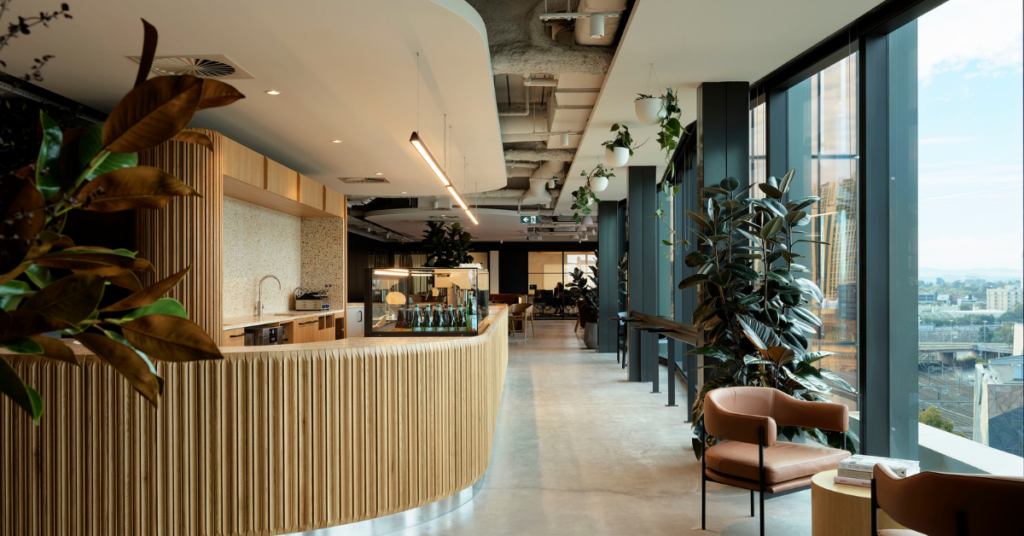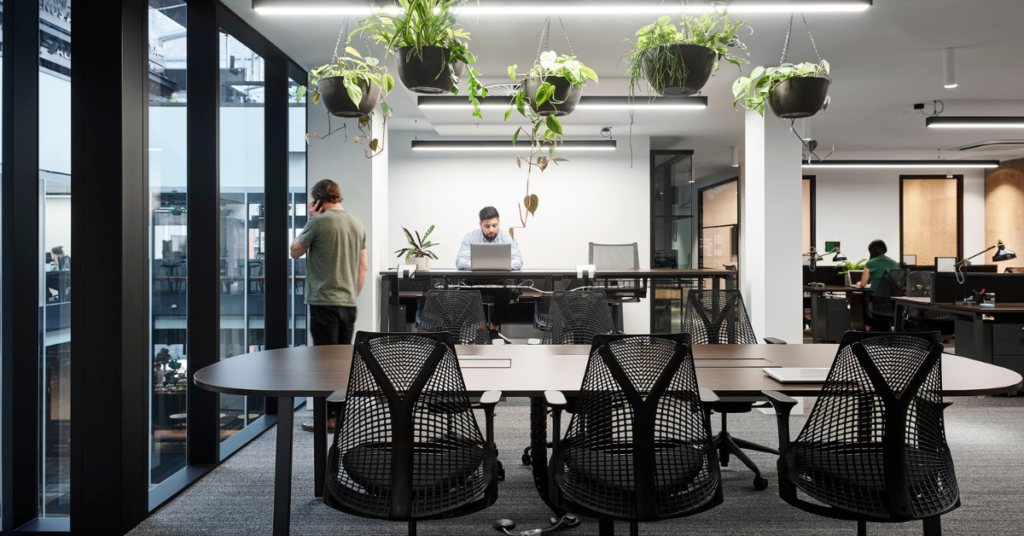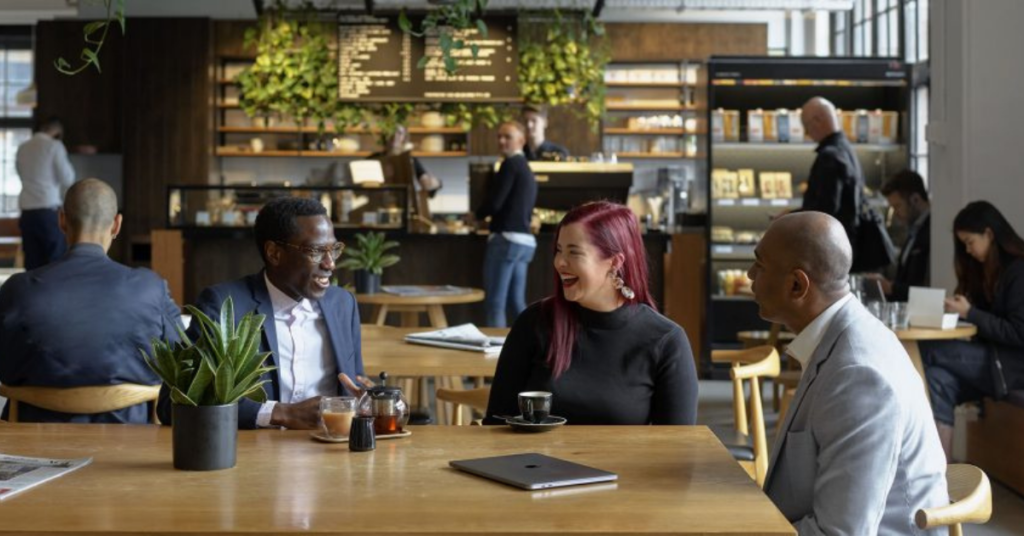For many of us, the pandemic has dramatically changed the way we work, and more specifically where we work. Whether it’s ditching the long commutes on public transport, working from home instead of sharing cramped offices with sniffly colleagues or getting lunch from a local cafe instead of labelled leftovers in the office fridge – in many ways, the future of work is more fun and flexible, and it’s here.

For a decade, Hub Australia has been providing premium workspace solutions to help businesses and their teams love where they work (again). With the goal of creating a luxury flexible work experience, through exceptional hospitality services, state-of-the-art technology and amenities, and exclusive member events and perks, they are dedicated to fostering a community of Australia’s best businesses.
After experiencing major workplace disruptions throughout 2020 and 2021, Hub knows that 2022 will present new challenges, opportunities and things to think about when it comes to how (and where) we work.
Thanks to Sanam Goodman, we head ‘Behind The B’ to hear about three ways they’ve made Hub better for people, planet, and communities, as well as three workplace trends to expect this year and three goals they’re striving for right now as a B Corp. We told you, all good things come in threes…
Three ways Hub is doing better for People, Planet & Communities
In 2013, Hub became one of Australia’s first Certified B Corporations, committing to creating a positive impact through community, environment, and people-focused initiatives. As Hub has grown, so too has our commitment to keeping every aspect of the business accountable and transparent.
People
People are at the heart of everything we do at Hub, from our dedicated service team to our valued members and their clients, becoming the first coworking location to achieve a WELL Health-Safety Rating in the country.
We regularly monitor customer satisfaction and uphold specific satisfaction targets that we share both internally and publicly. We make a conscious effort to respond to and action any enquiries and complaints within a month, and offer live support to customers in our workspaces. And we have implemented a formal program to incorporate customer testing and feedback into the design of our workspaces, amenities, and exclusive services, as part of our commitment to constantly improving our member experience.
Planet
We are Australia’s first Carbon Neutral Certified coworking provider and, as part of our commitment to creating a positive impact on the environment, our workspaces have been designed with the climate and sustainability in mind.
No matter the location, our spaces come with an abundance of natural light, greenery, and unique features such as bike storage, coffee ground recycling and locally-sourced products, where possible.
We monitor and report on our water and energy usage, and use energy conservation measures in our equipment, lighting, and office design. Think: daylight dimmers, double-paned windows and shading for sun-exposed walls.
Communities
As well as regularly running a range of community events for both members and non-members, we also engage with many community-based initiatives internally.
Our corporate citizenship program sees us taking part in a number of activities, including community investments, a formal donations commitment, advocacy for adopting improved social or environmental policies, and offering discounted products or services to certain groups within the community.
As an example, our annual Flexi Impact program offers a select number of complimentary Hub memberships to entrepreneurs or people part of a business in Australia working to make a positive difference to our community and environment, with a focus on businesses that are Aboriginal and Torres Strait Islander-led.

Three workplace trends to watch this year
Flexible work is the future. For many businesses and teams, COVID-19 served to abruptly introduce them and their teams to the plausibility of working from home. But as businesses start to venture back out, they are trying to strike the right balance between flexible working, cost-saving, and workplace experience or social interaction. Here are three trends we see in the organic tea leaves in 2022.
1. The role of the office has changed for good
The office is back – but for good reason – it will be different. If we snap back to how we worked pre-pandemic, it will have been a huge waste of the many learnings we’ve had about the importance of flexibility and autonomy for your people, your company, and the community.
The office’s role is set for a permanent change, and increasingly the focus will be on culture, learning, and collaboration, with a solid dose of social connection to build community and fulfil the need for people to be a part of something bigger.
Great workspaces will make the commute worth it, and the amenities will have to be good enough that ‘going to work’ is more akin to going to your favourite hotel than the office of old. After all: it’s been no fun stealing stationery from home.
Hot tip: If you don’t have a good answer to the question of ‘what’s your flexible work policy?’ in job interviews and upcoming salary reviews, watch your best talent go to a company that does.
2. Bigger companies will embrace flexible and coworking spaces
In the past, many businesses were using traditionally-leased spaces as their status quo, locking themselves into 5-10 year leases and paying for fit-out and design of their spaces. Then coworking and flexible office spaces emerged as a way to offer entrepreneurs, startups and freelancers a ‘place to be’ without the hefty set up costs or long-term commitment.
Workforces are changing rapidly, and the ability to scale workspaces up or down as needed, whether to meet growth or accommodate a hybrid work arrangement for your team, will increasingly be the deciding factor for many organisations that now find their large offices filled fractionally day-to-day.
A 10-person business looking to grow by 20% over the next three years will pay ~$1.7 million to lease and fit-out their own office space. Comparably, the same 10-person business could expect to pay ~$420,000 over three years at a flexible space – saving over $1.2 million.
While the head office on traditional lease terms won’t go away, but it will be complemented by an increasingly large proportion of CBD-based flex workspaces and suburban enterprise-grade shared workspaces. Something to think about for big businesses especially.
3. Upgrade that tech or face the rainbow wheel of death for your business
We were pleasantly surprised that tech had become good enough for most ‘knowledge worker’ tasks to be done remotely since the onset of the pandemic. In some senses, the ‘metaverse’ is already here, and we are working with the basic tools already available in the early stages of the digital office. As often happens though, the tech is set to advance far quicker than humans and organisations can catch up.
You don’t need to reinvent the wheel when considering all the possible variations and combinations of technology, security, and business processes, but you do need to keep your team’s tech savvy up to date.

Three goals for the future
1. Implementing a ‘Reflect’ Reconciliation Action Plan
A Reconciliation Action Plan (RAP) enables businesses and organisations to take long-term meaningful action to promote reconciliation with Aboriginal and Torres Strait Islander peoples. These plans provide practical benefits to Aboriginal and Torres Strait Islander peoples, increasing equity and encouraging self-determination – and implementing a ‘Reflect’ RAP will help us further develop relationships with Aboriginal and Torres Strait Islander stakeholders.
We are currently going through our rounds of feedback with Reconciliation Australia, with our RAP set to be endorsed by March 2022.
2. Adopting the B Corp Purpose and Stakeholder Governance Requirement
We’re excited to announce that we have committed to adopting the B Corp Purpose and Stakeholder Governance Requirement as the next step on our B Corp journey. Implementing the purpose and stakeholder governance requirement will mean that we have dedicated ourselves to a higher standard of accountability, conveying that we are operating beyond profit at all levels of our business.
3. Supporting our Flexi Impact members
After receiving over 100 applications, Hub has offered 62 complimentary Flexi Impact memberships already in 2022 to people who are part of an impact-driven business. As Australia’s best up-and-coming purpose-driven ventures continue to make a positive impact on our community and environment, these businesses have received a 24/7 access membership to one of Hub’s various locations in Melbourne, Sydney, Brisbane, Canberra, or Adelaide for the entire year.
Our Flexi Impact members operate in a range of impact areas, including refugee rights, Indigenous rights, climate change and sustainability, and mental health. One of our major goals for the year is to continue to support the growth of these businesses by providing them access to a thriving business community, networking opportunities, and exclusive business perks.
Thank you to Hub Australia for this jam-packed and insightful piece, a version of which was published as part of B Corp Month 2022 or throughout blogs on their website.
This month, as we invite you #BehindTheB to uncover what makes a B Corp a better business, learn more about B Corps across dozens of industries in Australia and Aotearoa New Zealand as the change the face of our global economic system ↗

